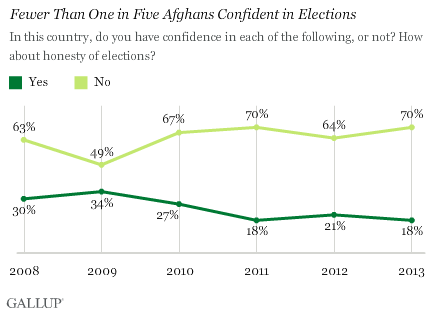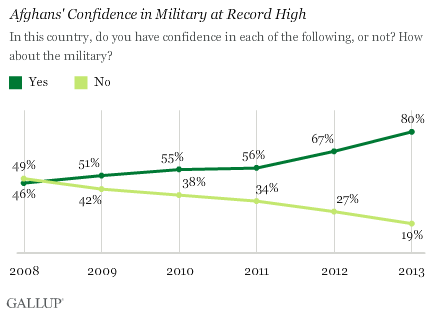WASHINGTON, D.C. -- As Afghans prepare to choose their next president on Saturday, their confidence in the country's electoral process is noticeably lower than before they visited the polls in 2009. Fewer than one in five Afghans expressed confidence last year in the honesty of elections, while the majority (70%) lacked faith in them.

Afghans' lack of faith in the transparency of the electoral process likely reflects the lingering after effects of the controversy surrounding the country's last presidential election, which was marred by fraud allegations and low voter turnout. Afghans' confidence in elections ranks among the lowest in South Asia, a region with already low confidence in elections relative to other parts of the world.
In addition to Afghans' relatively low level of confidence in their electoral process, the sudden withdrawal from the race by several prominent leaders and Taliban attacks threaten the success of Saturday's election. An election that is accepted by all major contestants and relatively free of widespread violence and fraud would be an important step forward for Afghanistan, with international troops set to withdraw later this year.
Afghans' Confidence in Military Growing
While Afghans' confidence in civilian mechanisms for democracy such as elections has flagged, confidence in the country's military has gradually risen over the past several years. In 2013, 80% of Afghans said they had confidence in the military, while 19% said they did not, the strongest rating for the military since Gallup began asking that question regularly in 2008. The majority of Afghans (54%) also express confidence in their local police. These may be among the most positive takeaways as the U.S. and other international forces withdraw.

Yet despite this bright spot of growing confidence in the military, 65% of Afghans say the government is not doing enough to fight terrorism, also an all-time high. This finding highlights the continuing challenges all national institutions in the country face in effectively working together under difficult economic and security constraints.
Bottom Line
With elections about to take place, Afghans' dismal life evaluations highlight that those jockeying for leadership at the ballot box will have some heavy lifting to do to improve the lives of their citizens. Additionally, candidates will be asking Afghans to support them in an electoral process that garners little confidence across large swaths of the population.
Strong confidence in the military may be a silver lining, but the failure to expedite a status of forces agreement prior to the election has left the Afghan economy and security situation with a heightened level of uncertainty. Negative perceptions on the government's efforts to fight terrorism are particularly troubling considering the potential for an uptick in insurgent activity as international forces withdraw over the next year or two. Unless Saturday's voting process outperforms previous elections in Afghanistan in terms of security and organization, it is unlikely to improve Afghans' confidence in the transparency of elections or other civilian institutions in their country.
For complete data sets or custom research from the more than 150 countries Gallup continually surveys, please contact us.
Survey Methods
Results are based on face-to-face interviews with 1,000 adults, aged 15 and older, conducted in April-May 2013, in Afghanistan. Before 2013, results are based on face-to-face interviews with approximately 1,000 adults, aged 15 and older, conducted in 2008-2012 in Afghanistan. For results based on the total sample of national adults, one can say with 95% confidence that the maximum margin of sampling error is ± 3.8 percentage points. The margin of error reflects the influence of data weighting. In addition to sampling error, question wording and practical difficulties in conducting surveys can introduce error or bias into the findings of public opinion polls.
For more complete methodology and specific survey dates, please review Gallup's Country Data Set details.
